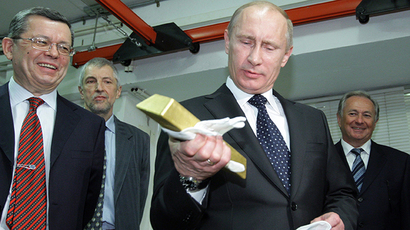No ‘gold rush’: Germany keeps reserves in the US

Germany’s plan to bring back the nation’s gold reserves to Frankfurt by 2020 has fizzled, and instead has for now decided to leave $635 billion of gold in US vaults.
Home to the world’s second largest gold reserves, worth $141 billion, Germany only keeps about one third of its gold ‘at home’, the rest is abroad. 45 percent is in the US Federal Reserve in New York, 13 percent in London, 11 percent in Paris, and only 31 percent in the Bundesbank in Frankfurt.
“The Americans are taking good care of our gold, we have no reasons for mistrust,” Nobert Barthle, the German Parliament Budget spokesman, told RT.
Critics of the slow progress disagree.
“While we haven’t been allowed to inspect escapes me, I’m no conspiracy theorist, but the Bundesbank should be able to audit the gold once a year like it does with reserves in Frankfurt,” Hans Olaf Henkel, German member of the European Parliament, told RT.
In the end of June for the first time a Germany delegation traveled to New York to check up on their gold holdings, the first in the last 10 years. The lack of inspection has led some to question whether it’s still there.
The movement to ‘bring the gold home’ was largely led by euroskeptics who campaigned to repatriate all the country’s previous metal by 2020. So far, they’ve only managed to bring back 10 percent, or 300 tons. Another 374 tons from the Banque de France is set to be returned to Germany in the near future.
“We are still missing for example published bar number lists, even though the US Federal reserve publishes this list for their own gold,” says Peter Boehringer, Founder of Repatriate our Gold Campaign.
However, auditors last week said they were pleased with the US continuing to look after Germany’s treasures. The delegation said there is no rush to bring it home, and that keeping it there even offers an advantage, as it can be used for emergency currency for gold swaps.
After World War II, Germany bought gold from the US Federal Reserve, but decided to keep in overseas instead of back to the Bundesbank. During the Cold War, fear of a Soviet invasion made overseas storage a safer option.
Recently, the Bundesbank has been criticised for not holding its reserves in Frankfurt, so it has decided that some should be brought back to Germany.
Transporting the gold will be a high security operation. When France transferred its reserves in 1966 it used a submarine.














